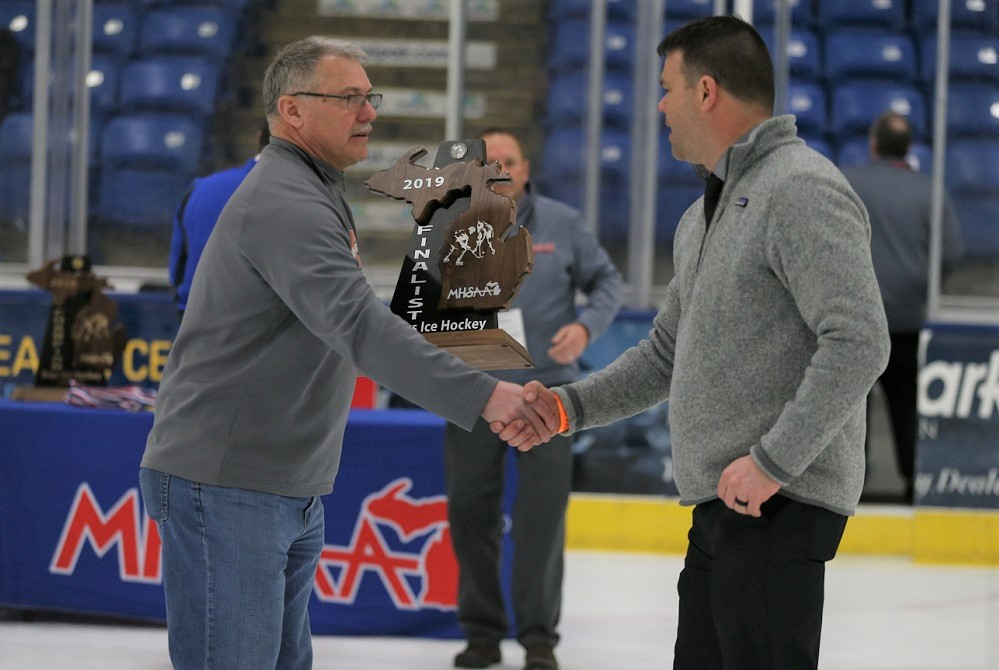
Schools Continue to Manage the Heat
July 16, 2015
By Rob Kaminski
MHSAA benchmarks editor
It certainly was not the MHSAA’s intent to spur the most historically frigid back-to-back winters the state has seen. Nor did the Association wish for one of the mildest summers in recent memory during 2014.
Seemingly, it’s just Mother Nature’s way of reading into MHSAA efforts for managing heat and humidity and acclimatizing student-athletes for warm-weather activities.
Since guidelines were put in place (recommended for regular-season sessions and required for postseason tournaments) before the 2013-14 school year, there have been relatively few days during which psychrometers have had to be implemented.
“The key is, we’ve got plans in place for when the climate returns to normal trends for return-to-school practices and contests in August and September, as well as early June events,” said MHSAA Executive Director Jack Roberts. “It is a bit ironic that there have been relatively few days since the guidelines were established that they’ve actually come into play.”
In a nutshell, the guidelines provide instruction for four ranges of heat index: below 95 degrees; 95-99 degrees; 99-104 degrees, and heat indexes above 104 degrees, with increasing precautions in place as heat indexes rise. An index above 104 calls for all activity to cease.
Certified athletic trainers Gretchen Mohney and James Lioy agree that recent requirements in heat and hydration guidelines are a step in the right direction and encourage that – when possible – an athletic trainer oversee the implementation. Simply taking a reading from just outside the AD’s office or at home does not simulate on-site conditions.
“This doesn’t take into account the radiant heat at the site, which can drastically affect the conditions that athlete plays in. It is essential that all parties involved in making decisions to play collaborate with one another,” Mohney said.
Heat-related deaths in athletics rank only behind cardiac disorders and head and neck injuries, but such fatalities might lead the way in frustration for families and communities of the victims. The reason? Heat-related illness is totally preventable.
Another source of mild frustration is the lack of recording within the state for those practice and game situations which warrant heat protocols.
When the Representative Council was formulating the Heat and Humidity Policy, it was also mindful of ways in which the MHSAA could assist schools in putting the plan into practice. Coaches, athletic directors and trainers needed a method to record information for athletic directors to view and for the MHSAA to track. The MHSAA developed interactive web pages on MHSAA.com which allow registered personnel to record weather conditions as practices and contests are taking place, using psychrometers.
Additionally, discounted Heat and Humidity Monitors and Precision Heat Index Instruments are offered to schools through a partnership between the MHSAA and School Health.
Yet, since the availability of such tools came to fruition two years back, fewer than 1,000 entries have been recorded, and many are multiple entries from the same schools.
Of the 772 entries, only 15 took place when the heat index was in excess of 104, while just 21 indicated an index of greater than 100. Cooler temperatures could be playing a factor in the overall number of participation, particularly in the northern areas of the state.
Nearly all of the responses came during fall practices, with a few isolated cases coming during the spring.
As Mohney pointed out, all resources must be properly used in concert with one another to achieve desired results.
Reminders of the tools available to schools are disseminated throughout the state each summer.

Hockey Star-Turned-Champion for School Sports to Receive MHSAA's Forsythe Award
By
Geoff Kimmerly
MHSAA.com senior editor
March 11, 2022
Once or twice a year, Bruce Horsch gets the question – mostly during a Winter Olympics year or after someone has watched “Miracle on Ice” and found out the “Horsch” that is mentioned twice is actually the recently-retired Houghton High School athletic director.
The final goaltender cut from the 1980 U.S. hockey team that went on to stun the world in winning Olympic gold, Horsch went on to coach at multiple college programs before becoming Houghton’s athletic director in 1996 at the age of 40.
These days, many also know him for the commitment, mentorship and leadership shown in that position through his retirement in 2019.
To celebrate his many contributions to interscholastic athletics, Horsch has been named the 2022 honoree for the Michigan High School Athletic Association’s Charles E. Forsythe Award.
 The annual award is in its 45th year and named after former MHSAA Executive Director Charles E. Forsythe, the Association's first full-time and longest-serving chief executive. Forsythe Award recipients are selected each year by the MHSAA Representative Council, based on an individual's outstanding contributions to the interscholastic athletics community.
The annual award is in its 45th year and named after former MHSAA Executive Director Charles E. Forsythe, the Association's first full-time and longest-serving chief executive. Forsythe Award recipients are selected each year by the MHSAA Representative Council, based on an individual's outstanding contributions to the interscholastic athletics community.
Horsch was described as a “not in the spotlight guy” by one of those who recommended him for the Forsythe Award, but he certainly spent time there. Horsch was a college hockey star and NHL draft pick, and had begun his minor league hockey career before playing with the U.S. team right up until the final cuts on the way to Lake Placid, N.Y.
After his playing days concluded, he coached collegiately before eventually settling in as Houghton’s athletic director for the 1996-97 school year.
“I was fortunate enough to play at Michigan Tech, and I was on a national championship team (in 1975) and I was on a national runner-up team (in 1976). When you played for (coach) John MacInnes up here, it wasn’t individuals – although we had great individuals – we won because we were a team” Horsch said.
“I’m not out for recognition. I enjoy being part of a team. I enjoy working with other people, and that’s my satisfaction.”
He led many important ones in his roles as a school sports administrator.
Horsch was named his region’s Athletic Director of the Year in both 2003 and 2019 by the Michigan Interscholastic Athletic Administrators Association (MIAAA), and served on the Upper Peninsula Athletic Committee from 2001-05. He has been an active member of the MIAAA, National Interscholastic Athletic Administrators Association (NIAAA) and Upper Peninsula Athletic Directors Association (UPADA), serving as secretary and president of the UPADA.
He also served as president of the Keweenaw Area Athletic Directors Association and secretary and commissioner of the Western Peninsula Athletic Conference.
“For years Bruce was one of the most respected voices not only in the Upper Peninsula but also the entire state,” MHSAA Executive Director Mark Uyl said. “He brought that perspective as a high-end athlete and transitioned extremely well as an educator and athletic director.”
Horsch was a frequent host of MHSAA Tournaments at the District and Regional rounds during his time at Houghton, and also hosted MHSAA Upper Peninsula Finals. He served as a host for sessions of the MHSAA PACE program, the coaching education program predecessor to the current Coaches Advancement Program (CAP).
His dedication to Houghton athletics was further noted when he considered retiring in 2017 but stayed on two more years to assist with a bond that resulted in in the upgrading of the school’s football field and track and building of softball and baseball fields as part of the athletic complex. Previously, he had led a referendum to have a second gymnasium built to provide an additional practice venue with girls basketball moving from the fall to winter season beginning with the 2007-08 school year.
“I’m proud of the fact that in the U.P. there are not many, if any schools that have the facilities that Houghton High School has,” Horsch said.
Horsch is a graduate of Hastings High School in Minnesota and earned a bachelor’s degree in business administration from Michigan Technological University. He led the Huskies hockey team to 58 victories in goal over four seasons and was part of the 1975 NCAA championship team, two of many reasons he was inducted into the Michigan Tech Sports Hall of Fame in 2007. He was drafted by the Montreal Canadiens during the ninth round of the 1976 NHL draft and played minor league hockey for two seasons. He then coached hockey collegiately for most of the 1980s as an assistant at Ferris State and then Michigan Tech.
He has continued to serve his community as a member of the Rotary Club of Houghton.
Past recipients of the Charles E. Forsythe Award
1978 - Brick Fowler, Port Huron; Paul Smarks, Warren
1979 - Earl Messner, Reed City; Howard Beatty, Saginaw
1980 - Max Carey, Freesoil
1981 - Steven Sluka, Grand Haven; Samuel Madden, Detroit
1982 - Ernest Buckholz, Mt. Clemens; T. Arthur Treloar, Petoskey
1983 - Leroy Dues, Detroit; Richard Maher, Sturgis
1984 - William Hart, Marquette; Donald Stamats, Caro
1985 - John Cotton, Farmington; Robert James, Warren
1986 - William Robinson, Detroit; Irving Soderland, Norway
1987 - Jack Streidl, Plainwell; Wayne Hellenga, Decatur
1988 - Jack Johnson, Dearborn; Alan Williams, North Adams
1989 - Walter Bazylewicz, Berkley; Dennis Kiley, Jackson
1990 - Webster Morrison, Pickford; Herbert Quade, Benton Harbor
1991 - Clifford Buckmaster, Petoskey; Donald Domke, Northville
1992 - William Maskill, Kalamazoo; Thomas G. McShannock, Muskegon
1993 - Roy A. Allen Jr., Detroit; John Duncan, Cedarville
1994 - Kermit Ambrose, Royal Oak
1995 - Bob Perry, Lowell
1996 - Charles H. Jones, Royal Oak
1997 - Michael A. Foster, Richland; Robert G. Grimes, Battle Creek
1998 - Lofton C. Greene, River Rouge; Joseph J. Todey, Essexville
1999 - Bernie Larson, Battle Creek
2000 - Blake Hagman, Kalamazoo; Jerry Cvengros, Escanaba
2001 - Norm Johnson, Bangor; George Lovich, Canton
2002 - John Fundukian, Novi
2003 - Ken Semelsberger, Port Huron
2004 - Marco Marcet, Frankenmuth
2005 - Jim Feldkamp, Troy
2006 - Dan McShannock, Midland; Dail Prucka, Monroe
2007 - Keith Eldred, Williamston; Tom Hickman, Spring Lake
2008 - Jamie Gent, Haslett; William Newkirk, Sanford Meridian
2009 - Paul Ellinger, Cheboygan
2010 - Rudy Godefroidt, Hemlock; Mike Boyd, Waterford
2011 - Eric C. Federico, Trenton
2012 - Bill Mick, Midland
2013 - Jim Gilmore, Tecumseh; Dave Hutton, Grandville
2014 - Dan Flynn, Escanaba
2015 - Hugh Matson, Saginaw
2016 - Gary Hice, Petoskey; Gina Mazzolini, Lansing
2017 - Chuck Nurek, Rochester Hills
2018 - Gary Ellis, Allegan
2019 - Jim Derocher, Negaunee; Fredrick J. Smith, Stevensville
2020 - Michael Garvey, Lawton
2021 – Leroy Hackley Jr., Byron Center; Patti Tibaldi, Traverse City
PHOTO: Houghton athletic director Bruce Horsch, left, hands coach Corey Markham the Division 3 finalist trophy after the Gremlins finished Division 3 hockey runners-up in 2019.

